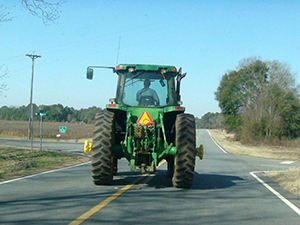 In South Carolina, it is not uncommon to see farm equipment on rural roads. Each year accidents involving tractors and other farm machinery occur on public roads, causing costly equipment damage, and more seriously, injury and death.
In South Carolina, it is not uncommon to see farm equipment on rural roads. Each year accidents involving tractors and other farm machinery occur on public roads, causing costly equipment damage, and more seriously, injury and death.
Collisions with other vehicles make up nearly half of these accidents. The remainder involve running off the road, overturning, striking a fixed object or falling from equipment.
The National Safety Council says about one-third of fatal tractor accidents occur on public roads. Below are 10 common-sense safety tips to help prevent accidents.
- Operators should have a valid driver's license and be thoroughly familiar with the operation of the machine. Children should never be allowed to operate or ride on equipment.
- Have slow moving vehicle emblems and reflectors in place on all tractors and implements. Emblems should be clean and in good condition. In certain locations the color of slow moving vehicle emblems can fade in two or three years. Replace broken, worn or discolored emblems.
- Be sure brake pedals are locked together and brakes are adjusted for equal pedal movement to assure straight-line stops when traveling on the road.
- Do not move farm equipment on public roads at anytime between sunset and sunrise. This also applies to daytime conditions when forward visibility is limited to 500 feet or when conditions such as snow or ice make roads hazardous.
- Properly light your farm equipment. This means having turn signals, headlights and taillights that conform to state vehicle codes. Flashing amber lights should be operated whenever farm equipment is traveling on public roads, unless prohibited by law. Turn off rear facing work lights. Make sure your load does not obscure lights and warning devices. Whenever possible have leading and trailing vehicles operating with flashing lights to warn oncoming and following traffic.
- Be sure tractors are equipped with a rollover protective structure, cab or frame. Always wear a seatbelt with this type of structure. If a rollover occurs, the safety belt helps keep the driver inside a "protective zone" created by the roll over protection structure.
- Make certain the tractor is properly counterweighted and all attachments are secure and properly mounted. Never operate attachments during road travel. Keep the power-take-off lever in neutral.
- Match the tractor to its load. Hitch the load only to the tractor drawbar or hitch points. The drawbar is designed to allow pulling of heavy loads without the risk of a backward overturn. If the load is hitched any higher, the tractor can roll over by rotating around the axle.
- For towed equipment without brakes, do not exceed speeds of 20 mph. Also, do not tow equipment without brakes that, when fully loaded, weighs more than one times the weight of the towing unit. For towed equipment with brakes, do not exceed speeds of 25 mph. Also, do not tow equipment that, when loaded, weighs more than four times the weight of the towing unit. (Note: When towing equipment has brakes, the tractor must be equipped with the correct braking package that is connected to the towed equipment.) Stopping distance increases with speed and weight of towed loads, as well as on hills and slopes. With or without brakes, towed loads that are too heavy for the tractor or are towed too fast can cause loss of control. Consider the total weight of the equipment.
- Slow down on turns and curves. A tractor's turning radius is much smaller than most automobiles. Taking a curve too fast can cause an overturn or jackknife if machinery is attached.
In addition to these 10 safety tips, tractor operators are also responsible for the following:
- Displaying a slow moving vehicle emblem on all slow moving equipment used on public roads.
- Checking slow moving vehicle emblems for bright and reflective colors according to code. Replace all faded or defective emblems.
- Obeying traffic laws, including speed limits, traffic signals and signs.
- Pulling over and allowing traffic to pass when it is safe to do so.
Remember whether you are driving a car or operating a tractor, the slow moving vehicle emblem can help you avoid collisions.
Get the Protection You Need for Your Farm Equipment
Whether you need commercial auto insurance for your tractor or personal auto insurance for your truck, Farm Bureau Insurance can help you. We got our start serving South Carolina farmers in 1955 and are still dedicated to serving your insurance needs today. Become a part of the Farm Bureau Insurance family and let us provide you with affordable quality insurance for all of your farming needs.